The Intel 9th Gen Review: Core i9-9900K, Core i7-9700K and Core i5-9600K Tested
by Ian Cutress on October 19, 2018 9:00 AM EST- Posted in
- CPUs
- Intel
- Coffee Lake
- 14++
- Core 9th Gen
- Core-S
- i9-9900K
- i7-9700K
- i5-9600K
CPU Performance: Office Tests
The Office test suite is designed to focus around more industry standard tests that focus on office workflows, system meetings, some synthetics, but we also bundle compiler performance in with this section. For users that have to evaluate hardware in general, these are usually the benchmarks that most consider.
All of our benchmark results can also be found in our benchmark engine, Bench.
PCMark 10: Industry Standard System Profiler
Futuremark, now known as UL, has developed benchmarks that have become industry standards for around two decades. The latest complete system test suite is PCMark 10, upgrading over PCMark 8 with updated tests and more OpenCL invested into use cases such as video streaming.
PCMark splits its scores into about 14 different areas, including application startup, web, spreadsheets, photo editing, rendering, video conferencing, and physics. We post all of these numbers in our benchmark database, Bench, however the key metric for the review is the overall score.
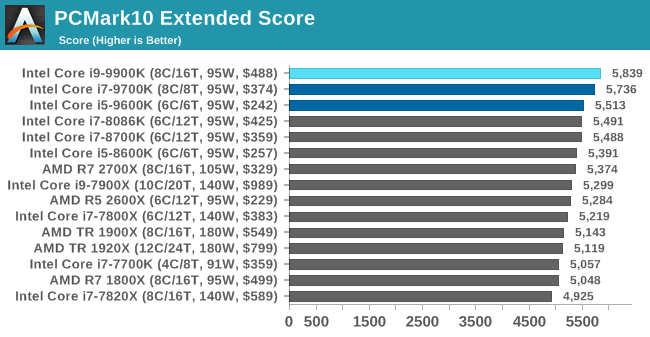
As a general mix of a lot of tests, the new processors from Intel take the top three spots, in order. Even the i5-9600K goes ahead of the i7-8086K.
Chromium Compile: Windows VC++ Compile of Chrome 56
A large number of AnandTech readers are software engineers, looking at how the hardware they use performs. While compiling a Linux kernel is ‘standard’ for the reviewers who often compile, our test is a little more varied – we are using the windows instructions to compile Chrome, specifically a Chrome 56 build from March 2017, as that was when we built the test. Google quite handily gives instructions on how to compile with Windows, along with a 400k file download for the repo.
In our test, using Google’s instructions, we use the MSVC compiler and ninja developer tools to manage the compile. As you may expect, the benchmark is variably threaded, with a mix of DRAM requirements that benefit from faster caches. Data procured in our test is the time taken for the compile, which we convert into compiles per day.
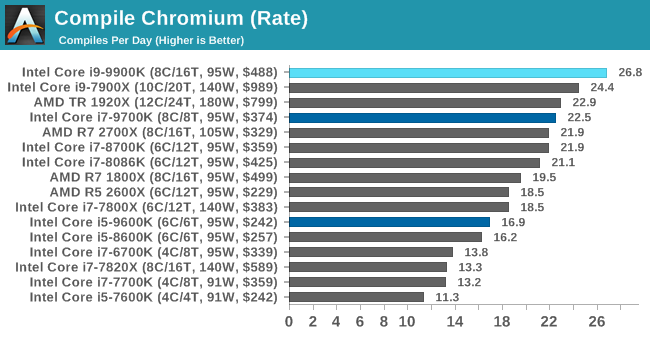
Pushing the raw frequency of the all-core turbo seems to work well in our compile test.
3DMark Physics: In-Game Physics Compute
Alongside PCMark is 3DMark, Futuremark’s (UL’s) gaming test suite. Each gaming tests consists of one or two GPU heavy scenes, along with a physics test that is indicative of when the test was written and the platform it is aimed at. The main overriding tests, in order of complexity, are Ice Storm, Cloud Gate, Sky Diver, Fire Strike, and Time Spy.
Some of the subtests offer variants, such as Ice Storm Unlimited, which is aimed at mobile platforms with an off-screen rendering, or Fire Strike Ultra which is aimed at high-end 4K systems with lots of the added features turned on. Time Spy also currently has an AVX-512 mode (which we may be using in the future).
For our tests, we report in Bench the results from every physics test, but for the sake of the review we keep it to the most demanding of each scene: Ice Storm Unlimited, Cloud Gate, Sky Diver, Fire Strike Ultra, and Time Spy.
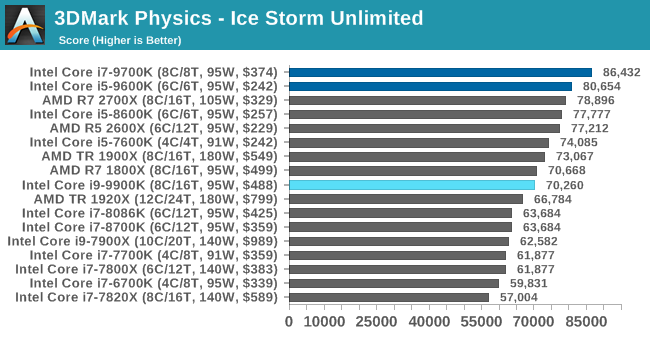
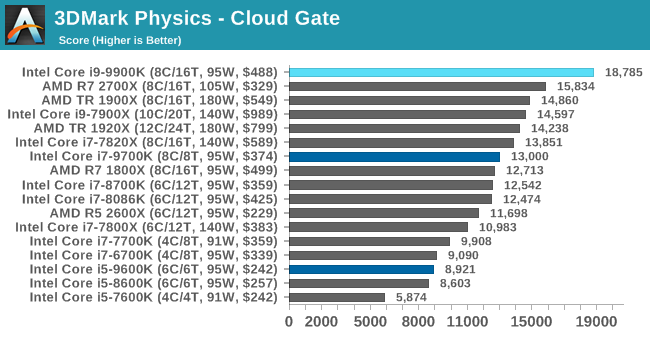
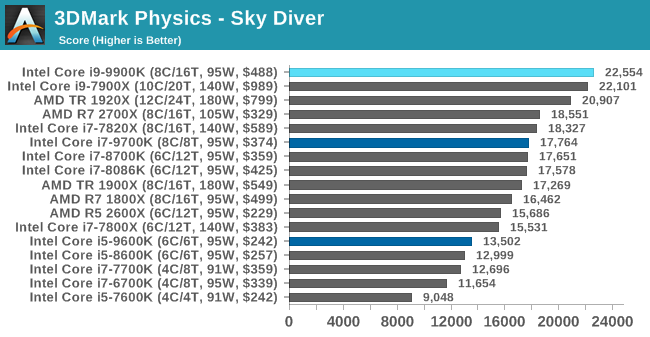
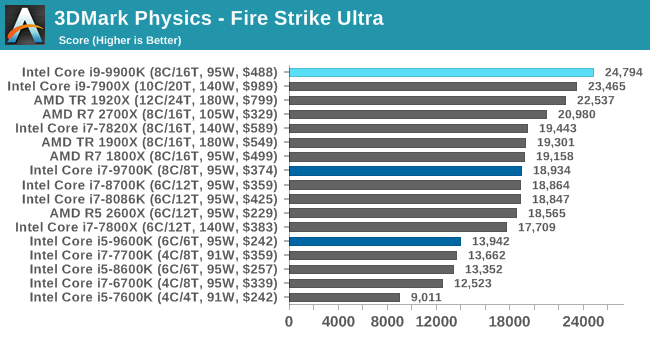
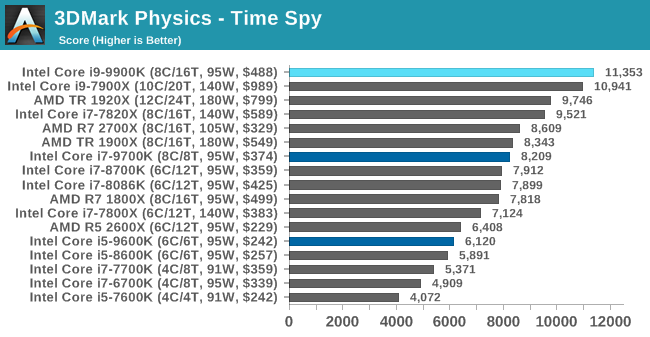
The older Ice Storm test didn't much like the Core i9-9900K, pushing it back behind the R7 1800X. For the more modern tests focused on PCs, the 9900K wins out. The lack of HT is hurting the other two parts.
GeekBench4: Synthetics
A common tool for cross-platform testing between mobile, PC, and Mac, GeekBench 4 is an ultimate exercise in synthetic testing across a range of algorithms looking for peak throughput. Tests include encryption, compression, fast Fourier transform, memory operations, n-body physics, matrix operations, histogram manipulation, and HTML parsing.
I’m including this test due to popular demand, although the results do come across as overly synthetic, and a lot of users often put a lot of weight behind the test due to the fact that it is compiled across different platforms (although with different compilers).
We record the main subtest scores (Crypto, Integer, Floating Point, Memory) in our benchmark database, but for the review we post the overall single and multi-threaded results.
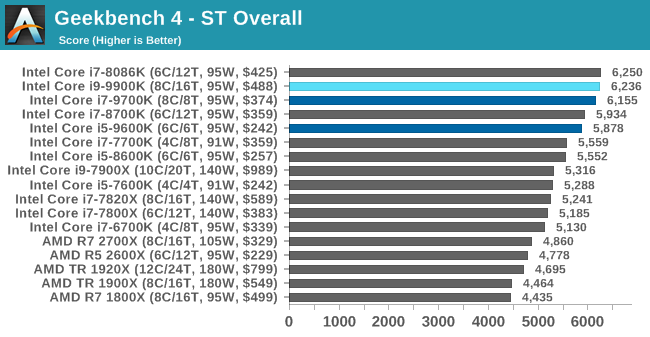
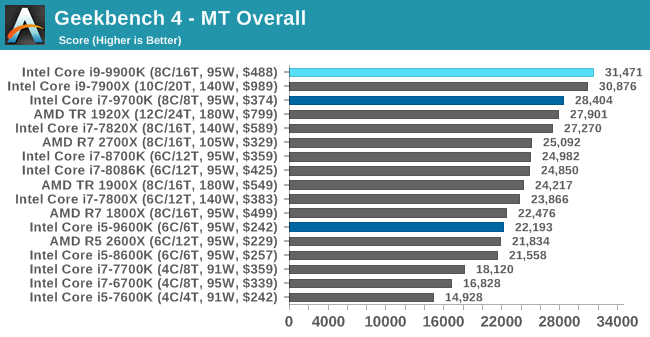










274 Comments
View All Comments
0ldman79 - Friday, October 19, 2018 - link
AMD needs to improve their AVX processing as well, but they've got Intel in a bit of a predicament.Hifihedgehog - Friday, October 19, 2018 - link
Ladies and gentlemen, I present to you...Intel’s FX 9000 series.
Now even hotter and more power hungry than ever!
mapesdhs - Sunday, October 21, 2018 - link
It reminds me a lot of the P4 days when Intel just had to shove clocks through the roof to remain relevant. And I don't know why tech sites are salivating so much on oc levels that are barely any better than a chip's max turbo, it's a far cry from the days of SB, especially since one can run a 2700K at 5GHz with sensible voltage and good temps using a simple air cooler (ordinary TRUE works fine) and one fan, without high noise (I know, I've built seven of them so far). To me, the oc'ing potential of the 9K series is just boring, especially since the cost is so high that for gaming one is far better off buying a 2700X, 8700K (or many other options) and using the save to get a better GPU.sgeocla - Friday, October 19, 2018 - link
Why compare to the TR 1920x ($799) and not to the TR 2950X ($899)?The TR 2950X kills it in almost every productivity benchmark even against i-9 9900k.
Not even mentioning the 9th gen power consumption.
Yorgos - Friday, October 19, 2018 - link
don't bother with the review.They show you the results that makes intel seem good.
Intel/Purch media have failed to show to the people that they exceed even Threadripper's TDP in order to fight Zen.
Desperate moves for desperate times.
Better look somewhere else for an unbiased review.
mkaibear - Friday, October 19, 2018 - link
What, you mean apart from page 21 where it shows that it almost doubles Threadripper's TDP for the same core count CPU and is 50% greater than the one which has 50% more cores than it does?Some reading comprehension lessons needed I think.
yeeeeman - Friday, October 19, 2018 - link
The 9900K looks like a nice CPU, but damn that power consumption is stupidly high. It is almost twice what the 2700X consumes.Hifihedgehog - Friday, October 19, 2018 - link
*High-end AIO required.AGS3 - Friday, October 19, 2018 - link
Twice the CPU - 8 cores over 5Ghz :)AutomaticTaco - Saturday, October 20, 2018 - link
Revised down. The first motherboard they used was extremely higher voltage settings.https://www.anandtech.com/show/13400/intel-9th-gen...